Have you been looking for a dairy-free protein powders or dairy-free protein shakes to add to your diet? Read this post for all the information you need to find the best one for you.
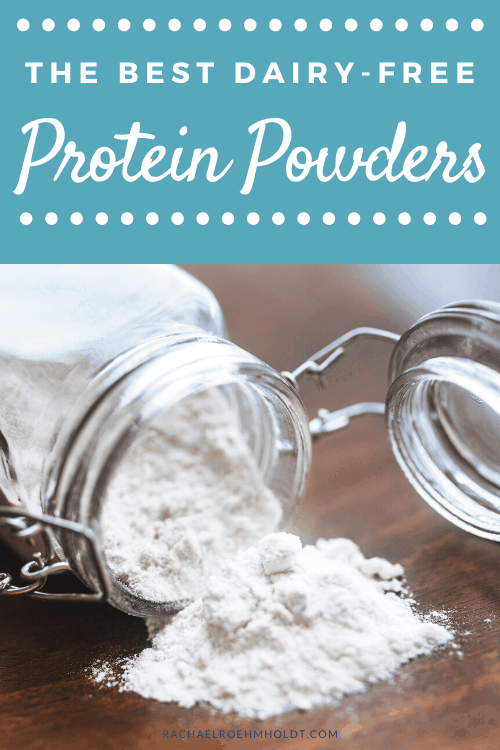
Note: I am a proud Amazon, Thrive Market, and Orgain affiliate and am happy to recommend their service and products to you. Please know that as an affiliate, I may receive a small commission on the products you purchase after clicking through my links. For more info, please see my disclosure policy here.
When it comes to eating a dairy-free diet and getting enough protein, you may consider adding protein powder to your diet if you don’t feel like you’re getting it elsewhere.
Protein powders are great for building muscle or getting an overall boost in nutrition in one single drink. There are so many dairy-free protein powders and dairy-free protein shakes available that I thought it would be useful to tackle this topic in depth.
In this post, we’ll talk about some frequently asked questions related to dairy-free protein powders and dairy-free protein shakes, as well as the different types of dairy-free protein powders available.
We’ll cover the basics about protein powders in general, then dive into more details around dairy-free protein powders and shakes.
The Basics of Protein Powder
What is protein powder?
Protein powder is a concentrated powder of one food or a blend of different foods that are high in protein.
Protein powders aim to be a supplement to a diet that requires extra protein where you may have issues getting adequate protein amounts from real food.
Protein powder is often used as a nutritional supplement for people who exercise a lot, are trying to gain weight, or trying to gain an all around boost in nutrition that they might not get elsewhere in their diet.
How much protein should you eat?
According to an article on Harvard Health Publishing, a good rule of thumb is that you can determine your daily protein intake by multiplying your weight in pounds by 0.36. For example, if you weigh 150 pounds, you can expect to aim for about 54 grams of protein in a day.
150 * 0.36 = 54 grams of protein per day
Of course, this all is based on how active you are as well. If you are sedentary, you may need less protein than if you exercise frequently.
With this knowledge of how much protein you need each day, let’s talk about the implications of what this means related to not being able to have dairy.
How do you get enough protein without dairy?
With the equation above, you might be wondering how you could possibly get enough protein in your diet without dairy. After all, dairy contains a lot of protein and is a major protein source for many people.
However, there are plenty of protein sources that are perfect for people on a dairy-free diet, such as:
- Meat and poultry
- Fish
- Eggs
- Nuts and seeds
- Beans
- Soy and soy-based products
- Quinoa
- Protein powders
With a varied diet of other high protein foods, you don’t need dairy in your diet in order to hit your protein needs each day.
Read on: Gluten-free protein bars
Now that you know why protein is so important for your body and how much you’ll need, let’s discuss more about protein powders and the different types you may find at the store.
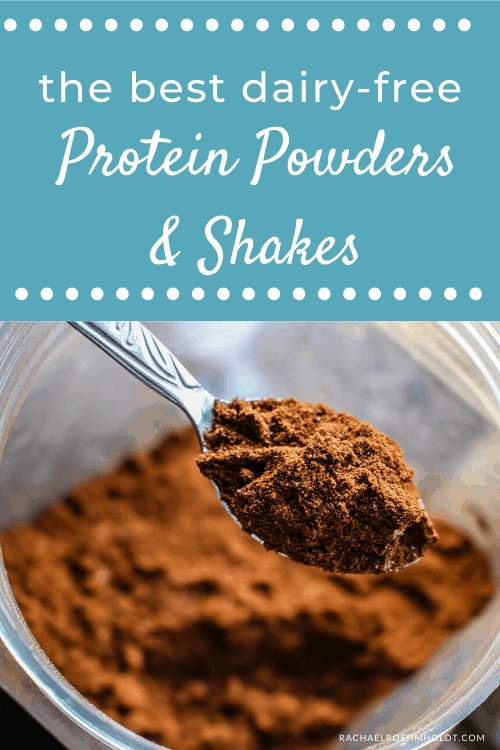
What’s the difference between whey protein, lactose-free protein powders, and non-dairy protein powders?
Whey protein powder is not dairy-free
Whey protein is a protein that is found in milk and is considered a dairy product. Since it is a dairy product and comes from animal milk, it is not dairy-free. If you eat a dairy-free diet, you’ll want to skip whey protein.
Read on: Is whey gluten-free?
Read on: Is whey dairy?
Lactose-free protein powder is not dairy-free
Lactose is the sugar that is found in milk. Since it comes from animal milk, it is considered a dairy product and not dairy-free. You’ll want to skip protein powders that are labeled as “lactose-free” but not “dairy-free” if you aim to follow a dairy-free diet.
Non-dairy protein powders may or may not be dairy-free
Surprisingly, a product that is labeled as non-dairy can still contain dairy and milk. Weird, right? The label of “non-dairy” as determined by the FDA means that a product can contain 0.5% or less milk by weight, in the form of casein or casineates.
This means that even if you’d assume that “non-dairy” means “dairy-free”… it’s not actually the case. Dairy-free means zero dairy in a product, whereas non-dairy may or not mean it contains dairy.
If you’re looking at a non-dairy protein powder, be sure to read the ingredient list and look for any hidden sources of dairy to help you identify if it’s truly dairy-free or not.
Do you need dairy-free protein powder?
Do most people on dairy-free diets need protein powder? Not really. For the most part, you can get healthy protein sources from whole foods, like meat, poultry, fish, beans, eggs, nuts and seeds.
However, they are a convenient source of protein if you find that getting protein in the form of whole foods is tough for you and your lifestyle. I’ll be honest that for a very long time, I was firmly against eating anything as processed as a protein powder (whole foods are SO important!).
However, after becoming a mom and realizing that some conveniences are necessary and okay, I started using them more and I use protein powder in my smoothies a few times a month.
Do dairy-free protein powders offer complete nutrition?
When we’re talking about complete nutrition, we mean that a food has an adequate amount of the nine essential amino acids our bodies need. These essential amino acids are those that our bodies can’t make on our own and we need them through food in order to get them and stay healthy.
One thing to remember about complete nutrition is that you don’t have to get all nine amino acids in every meal. You can get them throughout the day over different meals to get that “complete” nutrition.
So do dairy-free protein powders offer this complete nutrition? This is going to depend on the protein powder that you choose, however many dairy-free protein powders that are on the market are created with complete nutrition in mind.
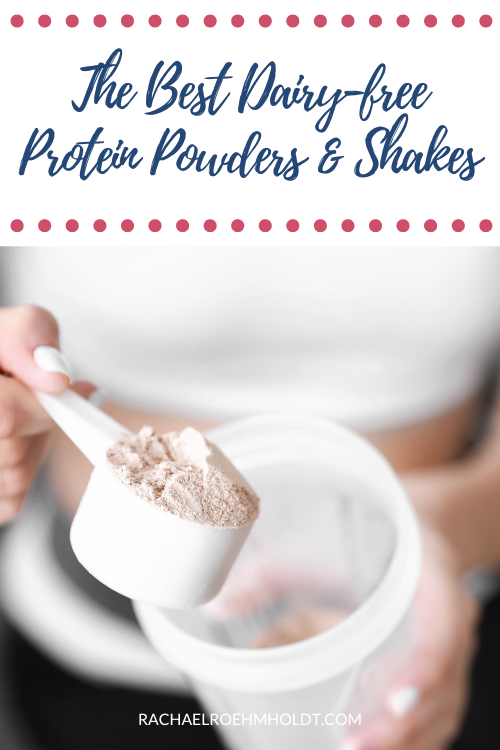
How much dairy-free protein powder should I use?
A serving of dairy-free protein powder is usually about 2 scoops as indicated on the back of the packaging. However, you may notice looking at different protein powders that a scoop size is different across brands and products.
Serving sizes may vary and using the scoop that comes with the product you buy is the best way to ensure you’re using as much or as little as is called for in order to get the results on the packaging.
That said, you don’t HAVE to follow the guidelines on the package of a dairy-free protein powder. I wouldn’t recommend taking more than is recommended on the back of the package, but I often will use less. I don’t always feel that I’ll need a full serving of protein in a smoothie or shake or I’ll want to scale back the flavor of the protein powder.
When you have a diet rich in protein in other areas, getting a full serving of 20 grams (or however much protein your protein powder contains) isn’t always necessary.
You’ll likely get protein throughout the day from other sources, so sometimes you’ll want to use less than is called for. Some days I use the full amount, other days I don’t. It’s just based on what I’m planning to eat that day and basing my decision around those plans.
What is in dairy-free protein powder?
You can find dairy-free protein powders with a number of different ingredients. While most normal protein powders contain whey, you can find a high protein content in a variety of different plant-based foods.
Most dairy-free protein powders contain different high protein foods, such as peas, hemp seeds, pumpkin seeds, brown rice, soy, sunflower seeds, chia seeds, and collagen. You can find dairy-free protein powders that contain just single protein ingredients, and others that have a combination of many different protein sources.
There are also protein powders that have multiple plant-based protein powders, plus superfoods and probiotics for digestive health.
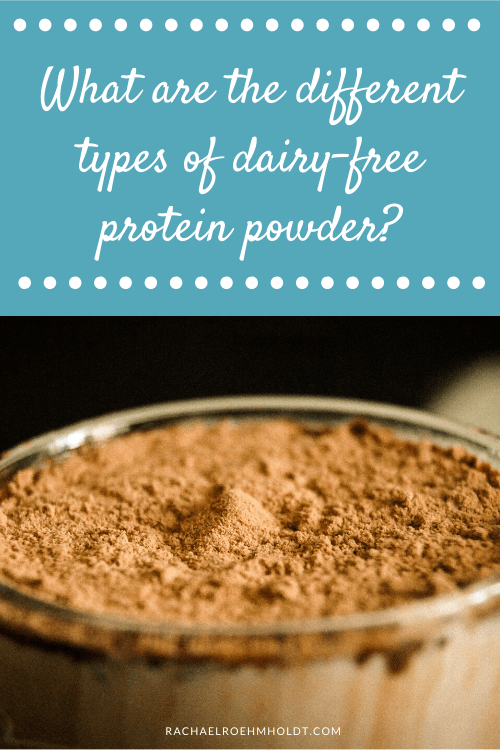
What are the different types of dairy-free protein powder?
With so many dairy-free protein powder options on the market, it can be hard to know what is right for you and your lifestyle and diet. Let’s go through some of the most popular types of dairy-free protein to help determine which could be the best option for adding to your dairy-free diet.
Pea protein
Pea protein is made from extracting the protein from yellow peas. It is a great option for a dairy-free protein powder, because it’s plant-based, has about 15 grams of protein for every 20 grams of powder, and is rich in iron.
Try this: Anthony’s Premium Pea Protein
Hemp protein
Hemp protein comes from the seeds of a hemp plant, and is a great plant-based source of protein. This protein source tastes nutty, is easy to digest, and has about 15 grams of protein for every 30 grams of powder.
Try this: Nutiva Hemp Seed Protein
Pumpkin seed protein
Pumpkin seed protein powder is made from pumpkin seeds. This type of protein powder offers a nutty flavor, 20 grams of protein for every 30 grams of powder, and is high in magnesium, phosphorus, and zinc. Pumpkin seeds are high in omega fatty acids, and since this protein powder is made from only pumpkin seeds, it is naturally dairy-free.
Try this: Sprout Living Pumpkin Seed Protein Powder
Brown rice protein
Brown rice protein powder is made from extracting rice protein from sprouted brown rice. With 25 grams of protein for every 30 grams of powder, this is one of the highest plant-based sources of protein I’ve seen. Brown rice protein can be easier for some people to tolerate with their digestion.
Try this: Naked Rice Organic Brown Rice Protein Powder
Soy protein
Soy protein powder is made by extracting the protein from soybeans. Soy protein offers 23 grams of protein for every 30 grams used.
While many love soy as a plant-based protein option, it is a controversial ingredient. Soy can affect your hormones, and if you have any issues with your thyroid will be an ingredient to stay away from. Soy also contains phytates, which can decrease mineral absorption.
Try this: Bulk Supplements Soy Protein Isolate
Read on: Is soy gluten-free?
Sunflower seed protein
Sunflower seed protein is made by extracting the protein from sunflower seeds. This protein powder offers 15 grams of protein for every 30 grams of powder used. It offers a mild and nutty flavor. Since it is plant based, it is safe for a dairy-free diet.
Try this: NaturesPlus Organic Sunflower Protein
Chia protein
Chia protein powder is made by extracting the protein from chia seeds and removing the oil. This high protein and high fiber powder offers an earthy flavor, 10 grams of protein per 30 grams used, and is loaded with vitamins, minerals, and antioxidants.
Try this: Foods Alive Chia Protein Powder
Read on: Are chia seeds gluten-free?
Sacha inchi protein
Sacha inchi is a high protein seed that is turned into a high protein source for protein powders. Sacha inchi is a lesser known protein source that provides complete nutrition and fiber, antioxidants, magnesium, potassium, and calcium. There are 16 grams of protein for every 27 grams of powder.
Try this: Super Foods Raw Organic Sacha Inchi Powder
Plant protein blends
Plant protein blends are made by combining different high protein plants and extracting the protein from them. In this case, they may combine any of the protein powders in this list, along with other fruits and vegetables to create a unique blend of vitamins, minerals, antioxidants, and protein.
Try these:
- Orgain Organic Plant Based Protein Powder <– get 25% off their best-selling flavors here!
- Vega Protein & Greens
- Purely Inspired Organic Protein Shake Powder
Collagen protein
Collagen is the most common protein found in your body. It helps to keep your skin, hair, and nails healthy and many people take it to keep their skin and joints feeling good.
You can get collagen protein in the form of protein powder too. Collagen protein powder is made from animal tissues. In collagen protein powder, you can expect to get about 18 grams of protein for every 20 grams of powder you use.
Try this: Vital Proteins Collagen Powder
Egg white protein
Egg white protein powder comes from dried egg whites from chicken eggs. This dairy-free option may be for you if you don’t want a completely plant-based protein source, but can’t tolerate dairy. Egg white protein powder contains 16 grams of protein for every 20 grams of powder.
Try this: NOW Sports Nutrition Egg White Protein
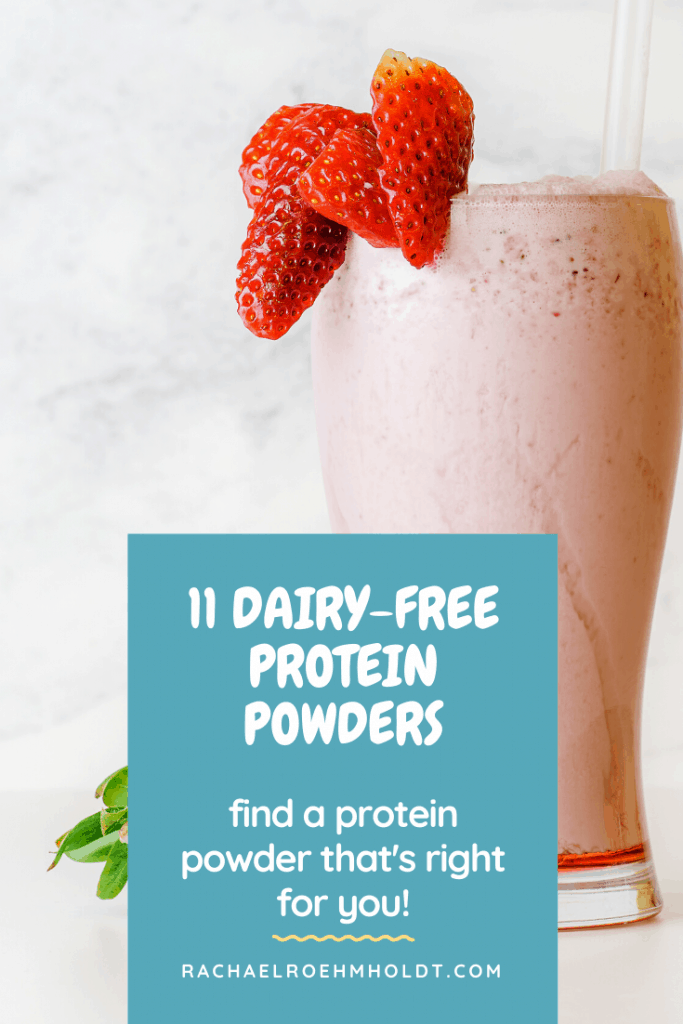
What is the best non-dairy protein powder?
With so many protein powders on the market, you may be wondering what the best non-dairy protein powder is. The answer isn’t perfectly clear as everyone’s health needs are different and unique.
Some people love to get their protein from just one source, like a single ingredient protein powder in the form of hemp seed protein powder, pea protein powder, or brown rice protein powder.
Others prefer the differences that come from combining protein sources with a plant protein blend (like I do). Some people want to use only plant based proteins, while others prefer to use an animal based protein powder, like collagen protein or egg white protein.
Tastes and preferences differ, so I highly recommend trying a few different options available and seeing what works best for you. Decide what tastes best, what you digest best, and how you feel after consuming it.
The best non-dairy protein powder is the one that you enjoy and can see benefits from using.
Now that we’ve discussed protein powders at length, let’s dive into their very close relative: protein shakes and drinks.
Do protein shakes contain dairy?
Many protein shakes contain dairy, however there are a number of brands and products available that are dairy-free. The best way to find out if a product contains dairy is by reading the ingredient lists.
If there are any names of dairy in the ingredient list, you’ll know to avoid it if you’re trying to stick with a dairy-free diet.
Read on: 5 Best Gluten-free Dairy-free Protein Powders
Read on: Is Ensure dairy-free?
Read on: Is Muscle Milk gluten-free?
Read on: Does Premier Protein have dairy?
Dairy-free and Non-dairy Protein Shakes
Most non-dairy and dairy-free protein shakes are simply a combination of a protein powder and water. Most companies that create protein powders also offer protein shakes that are easy to buy and consume. You can find these at your local grocery store, health food store, or even on Amazon or Thrive Market.
Lactose-free Protein Shakes
Protein shakes that are dairy-free or non-dairy that you can find in stores are also going to be lactose-free. If you are avoiding lactose, looking for a “dairy-free” protein shake will allow you to be sure you’re also avoiding lactose, the protein found in cow’s milk.
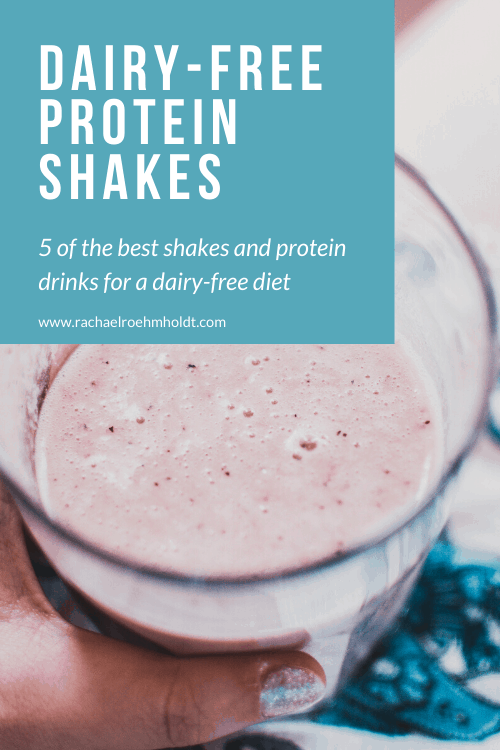
The Best Dairy-free Protein Shakes and Drinks
Many people love the appeal and convenience of protein shakes and drinks. Let’s talk about how to find great dairy-free protein shakes and what’s available on the market currently.
There are a surprising number of dairy-free and non-dairy protein shakes on the market today. Here are five great options:
Orgain Organic Vegan Plant Based Nutritional Shake
From this dairy-free protein shake, you can expect to get 16 grams of protein from the 11 oz package. This protein shake is made using the Orgain proprietary protein blend, made of pea protein, chia seeds, rice protein, and other ingredients. This shake is vegan, gluten-free, and non-GMO.
You can Orgain protein shakes on their website, on Amazon, or Thrive Market.
Evolve Protein Shake
This dairy-free protein shake offers 20 grams of protein in each 11 oz container. This protein shake uses mainly pea protein as the main protein source. This shake is dairy-free, soy-free, and gluten-free. It is also non-GMO.
OWYN Vegan Protein Shake
This vegan and dairy-free protein shake contains 20 grams of protein for every 12 oz bottle. The protein sources in this protein shake are their own proprietary blend of pea protein and pumpkin seed protein. This is a great allergy-friendly option, because it is gluten-free, dairy-free, soy-free, peanut and tree nut-free, egg-free, and has non-GMO ingredients.
Are there dairy-free protein powder alternatives?
If you aren’t sure about protein powder, but you’re interested in supplementing your protein intake, you might be curious about what options are available to you.
In this post, we’ve covered a lot of protein powder sources, but the best part is that all the foods these powders are derived from also offer a ton of great protein too.
You can find high amounts of dairy-free protein in any of these foods in their natural state, such as:
- Peas
- Hemp seeds
- Pumpkin seeds
- Brown rice
- Soy
- Sunflower seeds
- Chia seeds
- Sacha inchi seeds
- Animal meats and products that don’t contain dairy
- Eggs
I hope if you’ve been on the hunt for a good quality dairy-free protein powder, that this post has helped you get the information you need to find one that suits your diet and lifestyle.
With so many options out there, I highly recommend trying a few brands, flavors, and ones with different protein sources to see what you like best. I tried about 4 different brands before settling on one I use regularly that didn’t upset my digestion, tasted good, and I actually enjoy.
Have questions about dairy-free protein? Post them in the comments below!
If you loved this post, I hope that you’ll share it with your friends on Facebook and pin it for future reference on Pinterest.
Love this post? Be sure to check out some of my other great breakfast posts!
Not sure what to make for breakfast on a gluten and dairy-free diet? These posts will give you loads of ideas!
The Ultimate Gluten-free Dairy-free Breakfast Guide
On the hunt for a few gluten and dairy-free breakfast ideas? Look no further! Check out 75 ideas to help you start your morning right and stick with your dairy and gluten-free diet.
25 Dairy and Gluten-free Breakfast Casseroles
Start your day off right with these 25 dairy and gluten-free breakfast casseroles. Included in this roundup are pizza, Mexican, veggie, egg-free, sweet, and savory gluten-free dairy-free breakfast casserole recipes!
Gluten-free Vanilla Cake Donuts (Vegan, Dairy-free)
Enjoy these delicious, light, and fluffy gluten-free vanilla cake donuts that are also vegan and dairy-free. Great for special occasions, birthdays, or a fun weekend treat.
Gluten-free Chocolate Cake Donuts (Dairy-free, Vegan)
Are you looking for a chocolate donut recipe that's gluten-free, dairy-free and vegan? Try these gluten-free chocolate cake donuts that are super chocolatey, light, and fluffy!
Quinoa Breakfast Bowls
Quinoa breakfast bowls are great for a gluten and dairy-free breakfast idea! Make the quinoa ahead of time, then reheat and add your favorite toppings!
75 Gluten and Dairy-Free Breakfast Ideas
Have you been looking for some gluten and dairy-free breakfast ideas? Check out these 75 delicious and healthy breakfast ideas and recipes to share with you.
Gluten-free Dairy-free Breakfast Food List
Learn the foods to keep on hand for gluten-free dairy-free breakfasts. These ingredients can come together many different ways to create delicious healthy breakfast dishes for any day of the week!
5 Gluten-free Dairy-free Cereals
Discover 5 cereals that are both gluten and dairy-free in this roundup post.
Dairy-free Yogurt: What You Need To Know
Wondering if yogurt is dairy-free? Find out all you need to know about dairy-free yogurt, including where to buy, best brands, and how to make your own.
5 Best Gluten-free Dairy-free Protein Powders + Smoothie Recipe
Need a few gluten-free dairy-free protein powder recommendations? Check out the 5 Best Gluten-free Dairy-free Protein Powder picks plus a chocolate raspberry spinach protein powder smoothie recipe at the bottom of this post.
Gluten-free Waffles (Dairy-free, Vegan)
Try these gluten-free waffles that are also dairy-free, egg-free, and vegan. Perfect for a weekend breakfast or make-ahead breakfast option.
Gluten-free Dairy-free Biscuits & Sausage Gravy
This gluten and dairy-free biscuits and sausage gravy recipe is the ultimate comfort food. Enjoy it for a hearty breakfast or serve it at brunch.
Gluten free Pumpkin Bread (Dairy-free and Vegan Option)
Enjoy this gluten-free pumpkin bread for a perfect fall inspired breakfast or snack! This pumpkin bread is also gluten-free with a vegan option.
Gluten-free Dairy-free Cinnamon Rolls
Try these gluten-free dairy-free (and vegan) cinnamon rolls for a weekend breakfast or special holiday treat!
Chia Pudding
Chia pudding is simple, requires very minimal time or prep and only 3 ingredients. Best of all, it's gluten-free and dairy-free, and is extremely versatile - so you can flavor it however you like!
Dairy and Gluten-free Zucchini Bread
Do you love zucchini bread? Try out this dairy and gluten-free (egg-free option) recipe to use up your zucchini surplus this year!
The Best Gluten-free Banana Bread (Dairy-free and Vegan Option)
This gluten-free banana bread is easy, satisfying, and uses one bowl - and not to mention dairy-free, with a vegan option too.
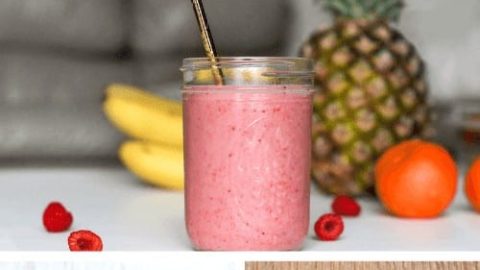
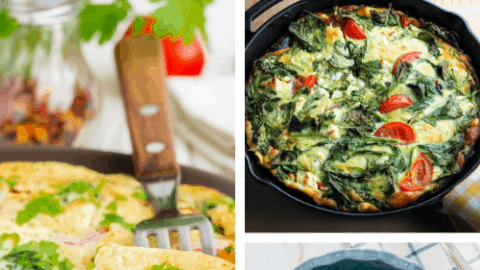

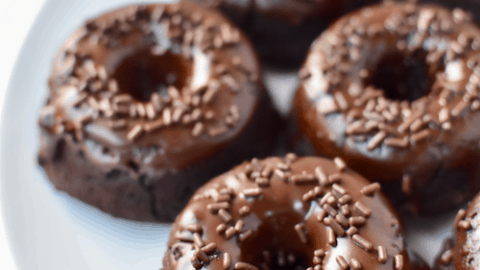
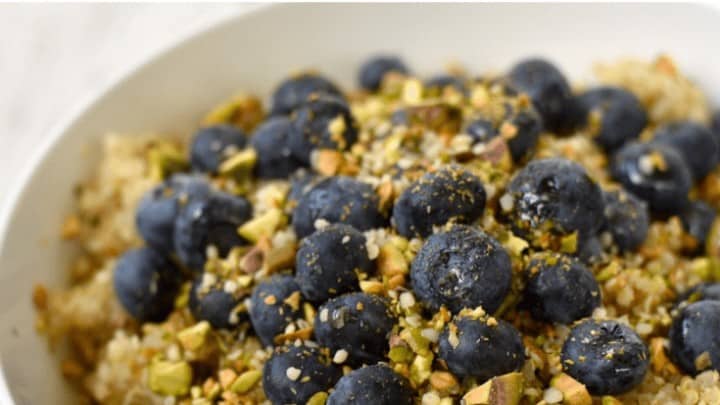
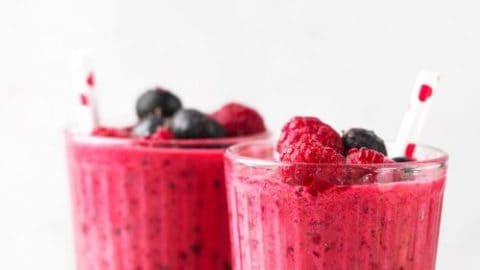
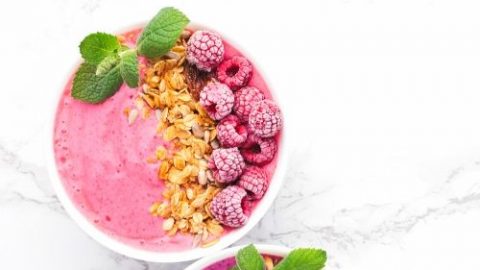
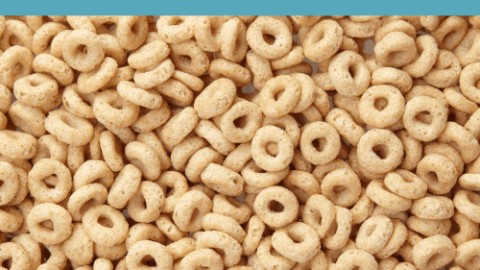
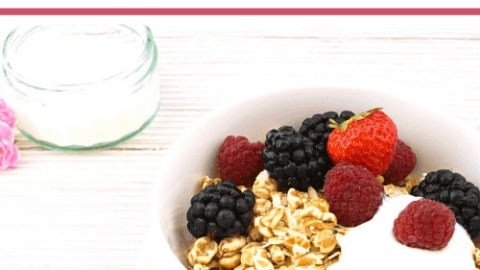
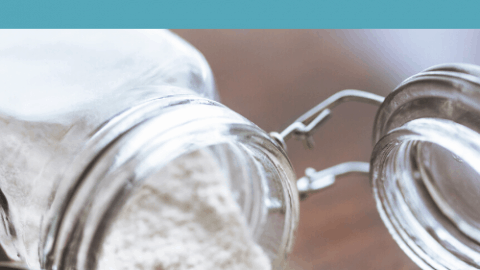
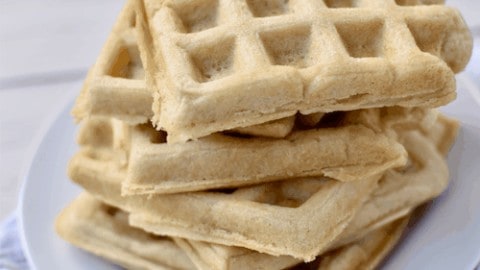
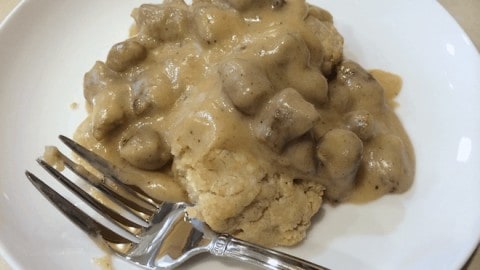
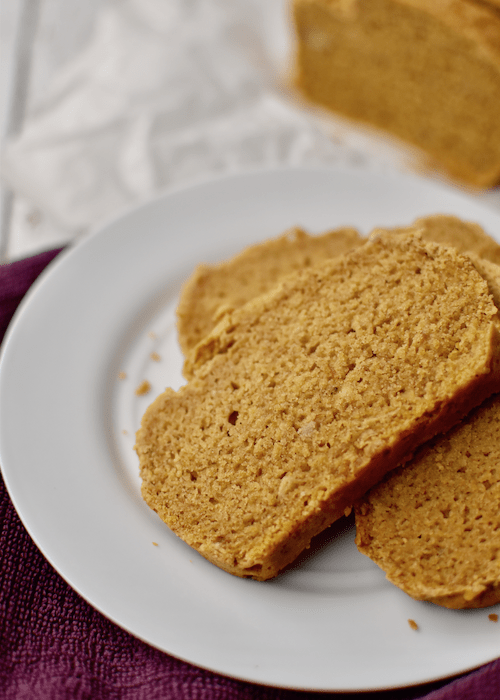
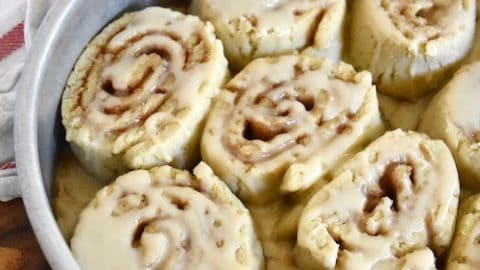
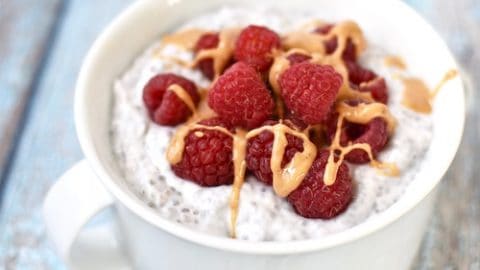
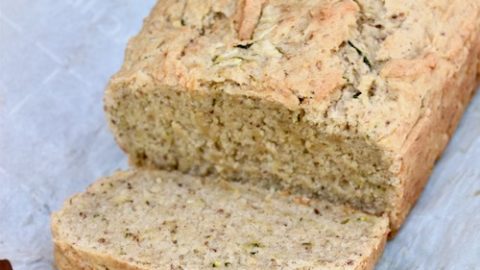
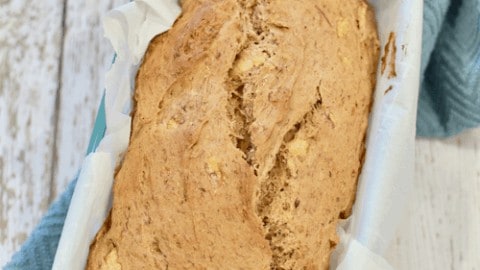
Leave a Reply